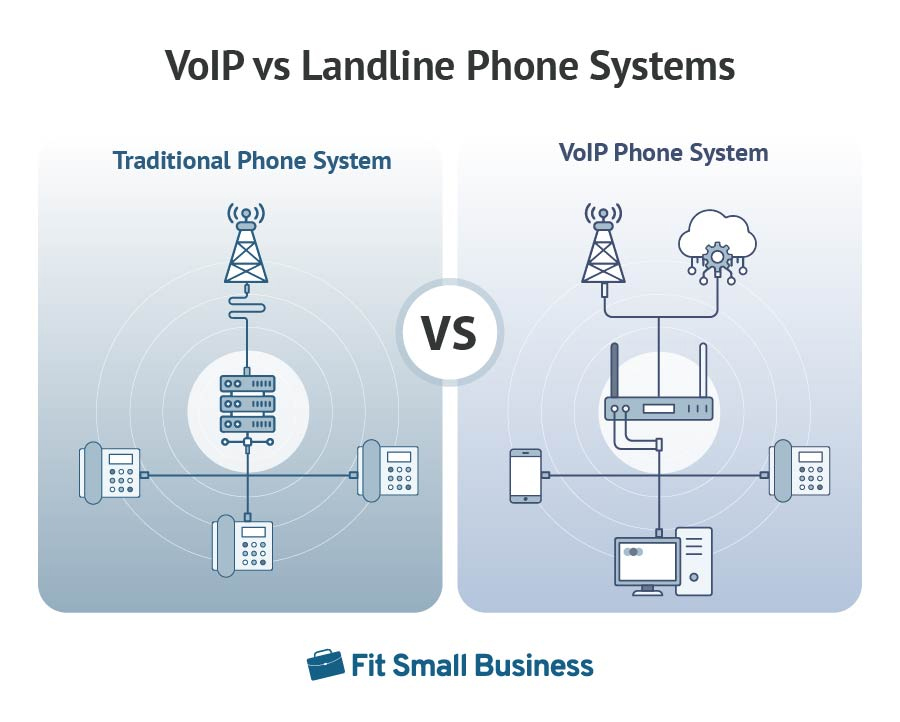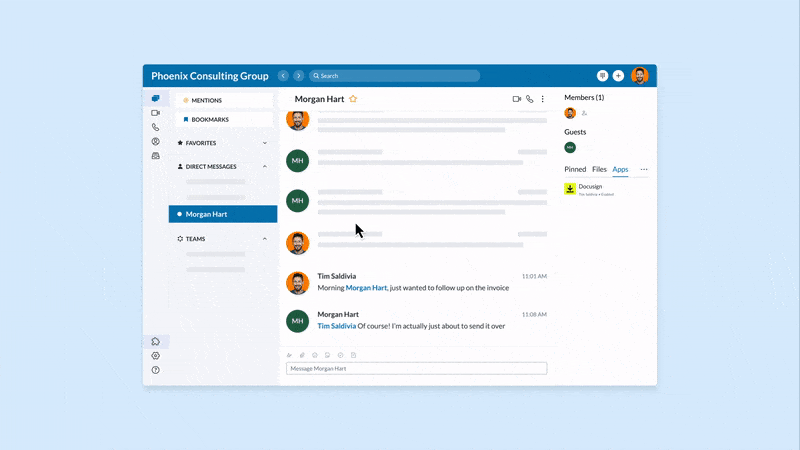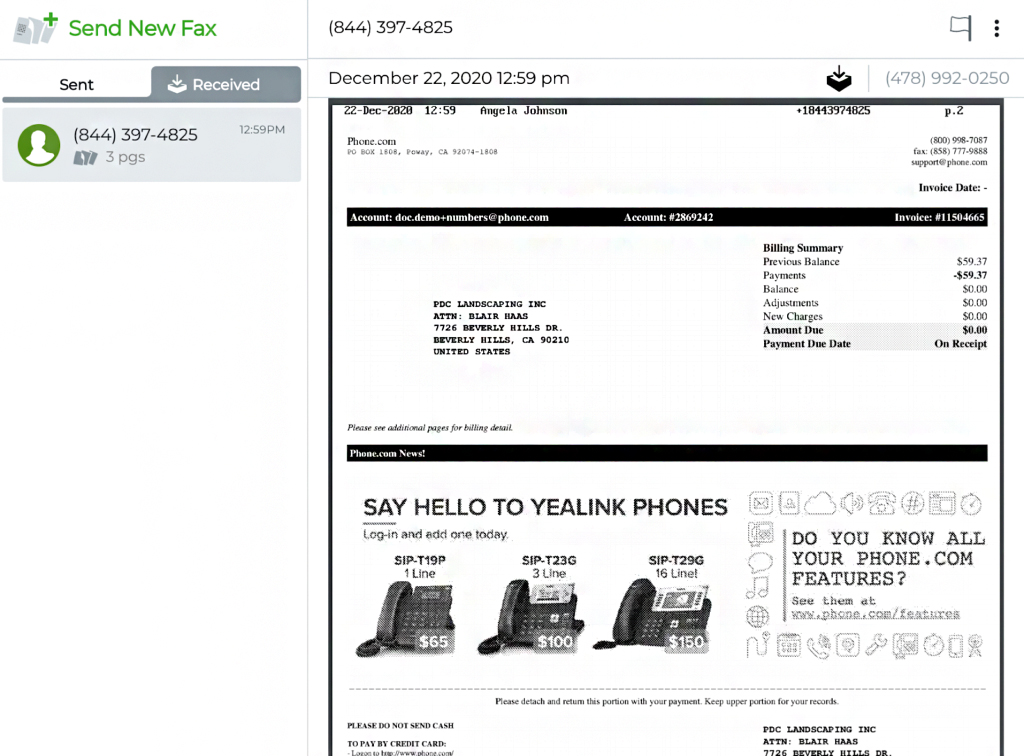Voice-over-internet-protocol (VoIP) allows you to make and receive phone calls over the internet. It improves communications by lowering expenses and integrating advanced telephony features like virtual fax and call transcriptions. Landlines are traditional phone systems that use physical wires and cables to transmit communications. They work best for companies that only need basic calling features or have a weak internet connection. Read our expert VoIP vs landline comparison to help you decide what’s right for your small business.
- VoIP: Best for small to mid-sized businesses (SMBs) wanting a low-cost, feature-rich alternative to landline services
- Landline: Best for companies lacking access to reliable communication services or facing frequent power outages
VoIP vs Landline at a Glance
VoIP | Landline | |
|---|---|---|
Best For | Growing teams needing lower setup and maintenance costs | Companies needing consistent call quality with basic calling features |
Estimated Monthly Cost (per User or per Line) | Ranges between $10 and $50 | Ranges between $50 and $80 |
Initial Setup Cost | Minimal | Moderate to expensive |
Technology | IP telephony | Analog voice signals |
Call Quality | Dependent on the strength of internet connection | Excellent |
Call Functionality | Robust | Limited |
Portability & Scale | Easy and affordable | Complex and expensive |
Maintenance | Easy and affordable | Complex and expensive |
Integrations | ✓ | ✕ |
User-friendly | ✓ | ✓ |
What Is VoIP?
VoIP phone systems are internet-based solutions that send voice data through internet connections instead of a regular or analog telephone line. In addition to phone functionality, VoIP provides access to other enterprise-level functionality, such as business messaging, video conferencing, and internet fax. Communications are through a desk phone, computer, tablet, or mobile phone over an internet connection.
During a call, your voice is converted into a digital signal and sent over the internet to the person you’re calling. At the other end of the line, their phone converts the digital signal back into an analog signal that is then heard through the receiver.
When setting up a VoIP system, there are two types you will encounter: on-premises and cloud-hosted.
- On-premises VoIP: This type of VoIP system is physically installed within your business premises. On-premise setups use either physical wires around the office or an IP internet connection, and both require a main private branch exchange (PBX) inside your workspace. A service provider manages the equipment upgrade and maintenance with locally installed software on computers and servers.
- Cloud-hosted VoIP: These types of VoIP systems use existing internet connections to make calls. The software is hosted on a service provider’s server and accessed via a web browser.
What Is a Landline?
Landlines are physical telephone connections that use analog technology, such as fiber optic cables or copper wires, to complete calls. The calls move across a physical line that connects two parties by transmitting signals through a series of relay towers. Like on-premise VoIP systems, business landlines require a PBX infrastructure, which your network provider installs. All phone lines are hardwired into this network.
There are two types of landline phones: corded and cordless.
- Corded landline: These are plugged into the provider’s cabling through a wall jack, as the phone base and the handset are connected by a cord.
- Cordless landline: This is similar to the corded landline, except the handset is wirelessly connected to the phone base.
How Do VoIP & Landlines Work?
The main difference between VoIP and landlines is that VoIP uses the internet to make calls, while landlines use wires and cables to transmit signals between two points. VoIP users place calls anywhere with an internet connection, while users making landline calls are limited to certain geographical areas where the analog system is present.
VoIP phone systems convert analog voice calls into digital data that travels over the public internet or a private IP network. Users place calls over the internet to other VoIP phones, landlines, mobile phones, and even computer-to-computer as long as an internet connection is available.

VoIP vs landline phone system comparison
On the other hand, landline phone services are provided through a dedicated line or system of wires and cables directly connected to the public switched telephone network (PSTN). It uses an analog telephone line and converts sound waves into electrical waves, which are transferred through a wire or cable network.
If you’re still undecided about which type of phone system is best for your company, check out our guide to business phone systems and see which one suits your needs.
Best VoIP & Landline Use Cases
For many small businesses, deciding between landline and VoIP phone systems is a significant consideration that entails weighing cost versus functionality. Since both offer unique benefits, the benefits often boil down to what your business needs. VoIP is excellent for businesses needing flexibility and portability, while landlines are known for reliability and consistent call quality. Both systems give teams the tools to communicate with customers and each other.
Advantages & Disadvantages of VoIP Solutions
Pros | Cons | |
|---|---|---|
VoIP |
|
|
Advantages of Using VoIP
VoIP phones offer communication solutions for a wide range of companies, including small and medium-sized businesses looking for advanced call management tools. Read on to explore what benefits you gain from using VoIP:
Phone security is crucial because businesses have a responsibility to protect internal and customer data and, in turn, protect your company’s reputation. VoIP systems have enterprise-grade security and leverage IP technology, including encryption and improved identity management. The best VoIP services for home offices commonly feature two-factor authentication, updated mobile device firmware, and data at-rest and in-transit encryption.
Want to learn more about data encryption? Read our detailed guide on how at-rest and in-transit data encryption works.
VoIP offers more features than traditional phone systems. Its features include call forwarding, blocking, caller ID, voicemail, and automatic call distribution. By combining rich calling and productivity features, such as instant messaging and web conferencing, team members can collaborate better for improved operational results.
VoIP helps businesses move calls seamlessly between agents and departments using call routing features like call forwarding, transfer, and auto-attendant capabilities. These features allow your team to efficiently identify caller purpose and match them with the most appropriate department for a better client journey.
Disadvantages of Using VoIP
While VoIP has plenty of business benefits, it is not exempt from having disadvantages. Some downsides of the VoIP service include latency, dependency on the internet, and connectivity issues.
Your VoIP service is as good as your internet connection. If your network is experiencing low bandwidth, the quality of your VoIP service will subsequently suffer. Your network bandwidth depends on your team’s size and the concurrent calls you will be making. It’s best to run a bandwidth test on your current network to understand your bandwidth requirements.
VoIP operates through the internet and requires a continuous power supply. If the power goes down, so does your internet connection. When this happens, you either wait for the power to return or prepare a backup power supply you can use during power outages.
To make calls over the internet, VoIP services break down your audio into data packets that are reassembled on the other end on time and in the correct order. Jitter and latency occur when packets are delayed, resulting in choppy audio or lag. Poor internet connection, incompatible routers, or insufficient cables cause these. This can be solved with high-speed internet as well as upgrading equipment.
Advantages & Disadvantages of Landline Solutions
Pros | Cons | |
|---|---|---|
Landline |
|
|
Advantages of Using Landlines
Analog phone systems may be older technology but still offer several benefits for business communications. Here are the significant benefits of landline solutions offered to small businesses.
Traditional phone systems are a tried-and-tested technology with a proven track record for being extremely reliable. Since the technology uses wires and cables, users can expect their connection to be smooth and stable. This is vital to maintaining operational efficiency and ensuring high customer satisfaction.
Landlines offer reliable connectivity and consistently high call quality with little to no dropped calls. Because landlines are line-based exchanges, users find landlines provide clear sound quality, making landlines great for long-distance calls.
Unlike high-tech virtual software, landline phone systems are straightforward to use and operate, minimizing training and knowledge development costs. For a small to mid-sized business with employees of all ages, an analog solution is one that everyone can use, from Gen Z employees to older generations.
Disadvantages of Using Landlines
When it comes to landline drawbacks, the cost of setting up and maintaining a landline phone system is certainly one of its major disadvantages. Our research shows the top disadvantages of using landlines:
Landline installation costs, per-minute calling rates, and maintenance and equipment expenses are more expensive than VoIP solutions. Setting up landlines requires hardware, switches, phone sets, routers, technical support staff, and equipment upgrades and maintenance over time. VoIP is more flexible, with many providers allowing bring-your-own-devices (BYOD) where you can use an internet-enabled device for calls, such as phones and laptops.
Landline systems restrict business expansion because it can be expensive to scale or relocate due to physical infrastructure. It also offers a single communication channel: the phone. Conversely, VoIP offers robust functionality that allows you to integrate voice, video, and messaging into a single platform.
Landline phone services require physical installation that costs time and money and takes up valuable office space. You must connect phone lines and set up wires and cables throughout the office space.
Quick tip: For those with landline systems who want to take advantage of what VoIP phone systems have to offer, consider using a Session Initiation Protocol (SIP) trunking service. This enables users to use legacy landline PBX equipment while still making connections over an internet connection.
Benefits of Switching From Landlines to VoIP Services
If you are still on the fence about VoIP vs landline for business and whether you should retain your current analog phone system, take a closer look at some of the benefits you stand to gain.
Greater Savings
Price is one of the most significant advantages businesses can look forward to upon switching from landline to VoIP. If you’re wondering is VoIP cheaper than a landline, the answer is yes. VoIP offers extensive phone features like team messaging, file sharing, and auto-attendants. VoIP bundled plans are charged monthly, per user, with available annual billing and volume-based discounts. Landlines often offer a flat rate per line with higher calling rates.
More Communication Features
VoIP phone systems do more than make and receive phone calls. Depending on your provider and plan, several call management features are available, including call forwarding, recording, and real-time analytics. VoIP systems are one-stop shops offering more than calling features—they also provide access to collaboration tools like task manager, team chat, and artificial intelligence (AI)-powered services.
Enhanced Mobility & Flexibility
VoIP technology enables coworkers to constantly communicate with you, even when working from home or out of the office. This means your team remains productive while traveling. They only need a tablet, computer, or smartphone to make and receive calls. When unavailable, messages are forwarded to their voicemail or email for easy access.
Increased Scalability
Traditional telephony solutions require physical wiring and cabling, which has subsequent costs when you scale your business. Unlike analog systems, VoIP quickly scales your system up or down by adding phone numbers, users, or features through your admin dashboard. Ooma offers full-featured residential VoIP for home offices with high-quality local and long-distance calling. Learn more about this provider in our comprehensive Ooma review.
Top VoIP Service Providers
The best VoIP providers provide feature-rich, affordable solutions for businesses looking to integrate various communication channels, such as chat, email, and phone. VoIP solutions offer greater mobility and a high level of customization to fit your ever-growing business needs.
Frequently Asked Questions (FAQs)
If your desk phone is connected to an Ethernet cord, it’s most likely a VoIP phone. On the other hand, landlines transmit signals through physical media, such as wire or fiber optic cable. A corded landline connects through a wall jack while cordless landlines connect to the cabling through a jack, but the handset is connected wirelessly.
Comparing VoIP vs landline security, both are subject to the same legal regulations and security protocols. Some consider VoIP more secure because of enterprise-grade security, such as password protection and encryption. However, landlines are a tried-and-tested technology that requires physical hacking of wires to intercept communications. The extent of security largely depends on what features your chosen service provider offers.
Yes. A company’s success is impacted by how it presents itself and its ability to maintain good working relationships with customers and partners. Pricing and features vary significantly from one provider to another. There are cheap VoIP services with free plans and enterprise-grade systems with unlimited service offerings. It all boils down to what you need and can afford. Inexpensive virtual systems are available if you cannot afford a full-fledged phone system.
Bottom Line
This VoIP vs landline comparison found VoIP systems are simple, easy-to-use communication tools that address different business needs. Landlines are best for companies with a static staff count looking for basic calling features. VoIP platforms are best for expanding companies with a solid internet connection needing extensive collaboration features. Determining which solution depends on your business communication and expansion goals.
Give VoIP phone systems a try by signing up for RingCentral’s 14-day free trial. This leading UC solution offers real-time insights on usage, adoption, and quality of service. Otherwise, check out AT&T’s landline services, including unmetered local and nationwide calls, voicemails, and caller ID.




